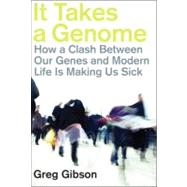
What is included with this book?
Greg Gibson is Professor of Genetics at North Carolina State University in Raleigh, and of Integrative Biology at the University of Queensland, Australia. He is a leader in the new field of genomics, studying how interactions between genes and the environment affect human health and organismal evolution. He holds a Ph.D. from the University of Basel, Switzerland, and did postdoctoral work at Stanford University. He is on the editorial boards of PLoS Genetics, Current Biology, Genetics, and other leading journals, and with Spencer V. Muse, coauthored A Primer of Genome Science, one of the field’s leading textbooks, now in its third edition.
| Preface:How a genetic culture clash with modern life is making us sick | p. ix |
| The adolescent genome | p. 1 |
| Breast cancerrsquo;s broken genes | p. 19 |
| Not so thrifty diabetes genes | p. 41 |
| Unhealthy hygiene | p. 65 |
| Genetic AIDS | p. 85 |
| Generating depression | p. 99 |
| The alzheimerrsquo;s generation | p. 121 |
| Genetic normality | p. 135 |
| Endnotes | p. 151 |
| About the author | p. 175 |
| Index | p. 177 |
| Table of Contents provided by Publisher. All Rights Reserved. |
The New copy of this book will include any supplemental materials advertised. Please check the title of the book to determine if it should include any access cards, study guides, lab manuals, CDs, etc.
The Used, Rental and eBook copies of this book are not guaranteed to include any supplemental materials. Typically, only the book itself is included. This is true even if the title states it includes any access cards, study guides, lab manuals, CDs, etc.